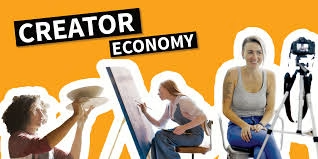
How to Join the Creator Economy: Can You Still Get Rich on YouTube or TikTok in 2025?
To join the creator economy, focus on identifying your unique skills and interests, creating valuable content, building an audience, and exploring monetization options. wow thats a lot to take in at once but like we all know that We’re living in the golden age of digital expression.
In 2025, according to our research teams reported that the creator economy is no longer a trend it’s a dominant force, valued at over $250 billion globally which they said its projected to exceed $500 billion by 2027. Platforms like YouTube and TikTok have transformed from entertainment hubs into career-launching engines, minting millionaires from bedrooms, dorm rooms, and smartphones.
But let’s address the elephant in the room:
Can you still get rich on YouTube or TikTok in 2025?
Short answer: Yes, but it’s harder, more competitive, and requires smart strategy, discipline, and timing.
In this guide, we’ll walk you through how to enter the creator economy, how to choose your platform, how people are still making real money, and whether this space is still worth entering in the age of AI-generated content, brand saturation, and viral fatigue.
ALSO READ
How to Become a Successful Actor in Nollywood
Top 10 Countries to Travel to in 2026
Part 1: Understanding the Creator Economy
The creator economy refers to the ecosystem of influencers, YouTubers, TikTokers, streamers, writers, podcasters, and digital entrepreneurs who make money by creating content that entertains, educates, or engages an audience.
This economy is powered by:
- Ad revenue
- Brand sponsorships
- Merchandise sales
- Digital products (courses, ebooks)
- Crowdfunding (Patreon, BuyMeACoffee)
- Platform bonuses and monetization programs
In Nigeria, Africa, and across the world, creators are monetizing content about:
- Comedy and skits (e.g., Broda Shaggi, Sabinus)
- Beauty and fashion (e.g., Dimma Umeh)
- Lifestyle vlogs
- Gaming and tech (e.g., Fisayo Fosudo)
- Cooking, fitness, crypto, finance the list goes on.
Part 2: YouTube vs TikTok Which Platform Makes You Richer?
YouTube The Long Game
Pros:
- Higher ad revenue through AdSense
- Long-form content with higher retention more earnings
- Stable income with more control
- Better for educational or “deep-dive” creators
Cons:
- Growth is slower
- Content creation is time-consuming
- Requires decent equipment and editing skills
Monetization Options:
- AdSense
- Channel memberships
- Super Thanks / Super Chat
- Sponsored content
- Affiliate marketing
- YouTube Shorts Bonus Fund
Average Earnings:
- 1,000 views = $1 to $20 (depending on niche and geography)
- Some Nigerian YouTubers make ₦300,000 to ₦2 million+ monthly from AdSense alone
TikTok The Virality Casino
Pros:
- Easy to go viral
- Fast audience growth
- Short, snackable content
- Doesn’t require professional equipment
Cons:
- Lower ad revenue
- You don’t own your audience
- Attention span is short
- Monetization is heavily dependent on brand deals and product sales
Monetization Options:
- TikTok Creator Fund / Creativity Program
- Brand partnerships
- Live gifts / coins
- Affiliate links
- Merch and product marketing
Average Earnings:
- TikTokers earn $0.02 to $0.04 per 1,000 views from the Creator Fund.
- Nigerian TikTokers rely more on brand deals, ambassadorships, and content gigs.
Part 3: Can You Still Get Rich?
Yes, but with some non-negotiable truths:
1. It’s Not 2019 Anymore
Back in 2019, you could blow up with one viral video. In 2025, you need consistency, content strategy, SEO knowledge, and branding. The platforms reward watch time, not just views.
2. Niche is King
General content is dead. Riches are in the niches. Choose a profitable, passion-driven niche like:
- Personal finance
- Relationship advice
- Skincare routines
- Afrobeat reviews
- Education (JAMB, WAEC, IELTS)
- Diaspora life (e.g., “Life in Canada/Nigeria/UK”)
- Tech reviews, gadgets, phones
3. You Must Treat It Like a Business
Creators who succeed are content entrepreneurs:
- Schedule their videos
- Analyze metrics
- Reinvest in better equipment
- Collaborate strategically
- Launch digital products (e.g., courses, eBooks)
4. AI is Your Friend If You Use It Right
Many YouTubers now use AI tools like:
- ChatGPT for scripting
- CapCut and Descript for editing
- Pictory or InVideo for faceless video creation
AI can 10x your production but it cannot replace your personality and authenticity.
Part 4: Step-by-Step Guide to Join the Creator Economy
Step 1: Choose Your Platform (Or Start with Both)
- Want long-term income? → Start with YouTube
- Want fast attention? → Start with TikTok
- Want both? → Create Shorts/Reels from long-form videos
Step 2: Pick a Profitable Niche
Use tools like:
- Google Trends
- TubeBuddy
- AnswerThePublic
- TikTok Trends dashboard
…to find what’s trending and where you can fit in.
Step 3: Create a Content Calendar
Success = consistency. Start with:
- 1–2 YouTube videos per week
- 3–5 TikToks per week
- Post at optimal times (e.g., evenings, weekends)
Step 4: Film and Edit Smartly
Use your phone if you have to. Start scrappy.
Beginner tools:
- CapCut
- Canva
- VN Editor
- YouTube Studio app
Use good lighting, keep your videos under 3 minutes, and get to the point quickly.
Step 5: Optimize for Search
Learn SEO:
- Use keywords in your titles
- Add hashtags and tags
- Write compelling descriptions
- Create clickable thumbnails
These small details boost your discoverability.
Step 6: Monetize Smartly
Once you have an audience:
- Launch a merch line or digital course
- Do affiliate marketing
- Get brand deals
- Enable monetization programs
- Use email lists or Patreon to own your audience
Part 5: Top Creators in Nigeria Who Got Rich
1. Mr. Macaroni (YouTube + Instagram)
From skits to Nollywood to brand deals with MTN, Vbank, and more.
2. Kiekie (TikTok + TV)
Comedy, fashion, and presenting skills earned her deals with brands like Samsung and Tecno.
3. Taaooma
Built a brand empire from skits, then opened a production company.
4. Tayo Aina (YouTube)
Creates travel and documentary content. Partnered with international brands like Google, Binance, and Canva.
Part 6: Mistakes That Kill Creator Dreams
- Waiting to be “perfect” before starting
- Obsessing over views instead of impact
- Not niching down
- Inconsistency
- Ignoring community building
- Not learning about monetization
- Believing viral = success
WhatsnextNG Thoughts: Should You Still Join?
Absolutely. The creator economy is not saturated it’s evolving. There is still room for fresh voices, especially African stories, Gen Z perspectives, and creators who offer value over vanity.
If you bring your authentic voice, a real strategy, and the guts to stay consistent, platforms like YouTube and TikTok can still make you rich not just in money, but in freedom, influence, and legacy.
What’s Next?
Want to know how to:
- Start a faceless YouTube channel?
- Launch a profitable course from your audience?
- Make money on TikTok in Nigeria without brand deals?
Tell us and we’ll break it down in our next WhatsNextNG guide.
Frequently Asked Questions (FAQ)
1. Is it too late to start a YouTube or TikTok channel in 2025?
No, it’s not too late. While the space is more competitive than in past years, new creators still go viral and build full-time incomes every day. What matters now is strategy, consistency, and niche clarity not timing.
2. Which platform is better for making money YouTube or TikTok?
It depends on your goals.
- YouTube offers more stable, long-term income through ad revenue.
- TikTok is great for fast growth and brand deals but pays less directly.
Many successful creators now use both platforms to grow and monetize effectively.
3. Can I still make money if I don’t have many followers?
Yes, but monetization opportunities increase with audience size. Even with a small but engaged following, you can earn through:
- Affiliate marketing
- Selling digital products
- Brand collaborations
- Patreon or membership communities
4. Do I need expensive equipment to get started?
Not at all. Many creators start with just a smartphone and good lighting. What matters more is:
- Clear audio
- Good storytelling
- Valuable content
You can upgrade your gear as your channel grows.
5. How long does it take to make money on YouTube or TikTok?
It varies. Some people earn money in 3–6 months, while others take over a year. Success depends on:
- Content quality
- Posting consistency
- Niche demand
- How well you understand platform algorithms
6. What types of content are profitable in Nigeria?
Nigerian creators are succeeding with:
- Comedy skits
- Vlogs (lifestyle, travel, motherhood)
- Tech reviews
- Fashion and beauty
- How-to guides (e.g., “how to japa”)
- Educational content (JAMB, IELTS, finance)
7. How much do Nigerian YouTubers and TikTokers actually earn?
Earnings vary widely:
- YouTube: ₦300,000 to over ₦2 million/month for popular creators via AdSense
- TikTok: ₦100,000 to ₦1 million+/month mainly through brand deals and influencer gigs
Remember, most creators combine multiple income streams to reach higher earnings.
8. Can I be successful without showing my face?
Yes. Many creators run faceless channels using:
- Voiceovers
- Animation
- Slideshows
- Stock footage
These work best in niches like education, tech reviews, tutorials, and storytelling.
9. Is AI going to replace creators?
AI will help not replace real creators. Tools like ChatGPT, Pictory, and CapCut can help with scripting, editing, and repurposing content, but authentic personality, relatability, and human creativity are still what drive loyal audiences and income.
10. What is the biggest mistake new creators make?
The biggest mistake is giving up too soon. Others include:
- Trying to copy others without adding value
- Not having a content plan
- Posting inconsistently
- Ignoring monetization opportunities





